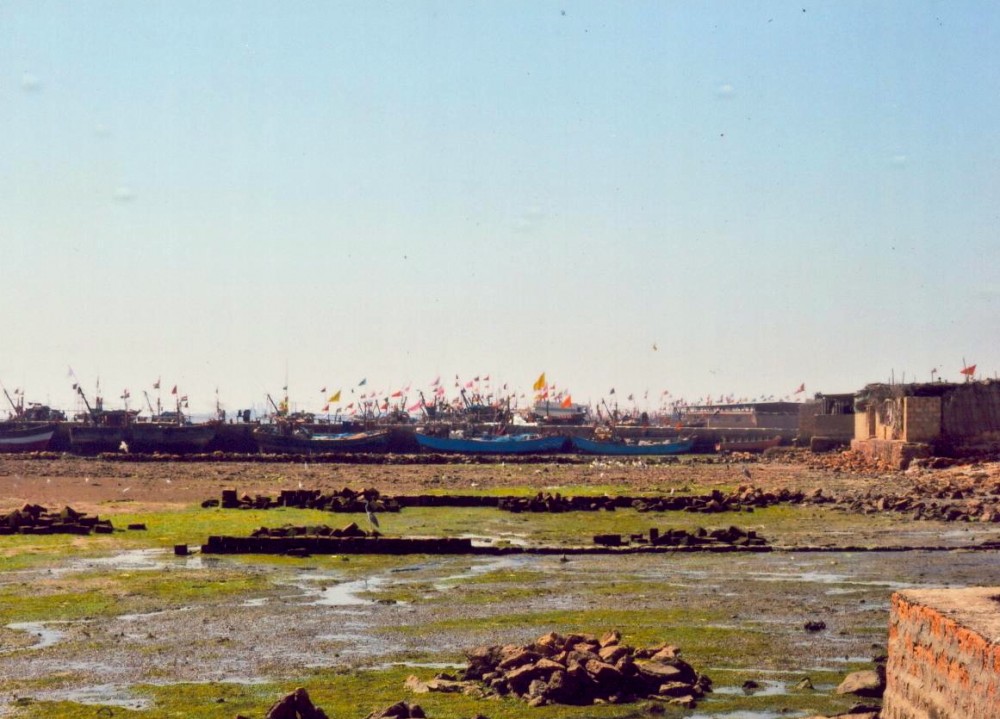
“Sister, the natural shape of this piece of land, the usual direction in which the wind blows here and the magnitude with which the waves hit the coast, everything together makes up for an ideal boat-mooring spot!” So says Shakir Bhai a resident of Okha Port in the Jamnagar District of the Indian state of Gujarat.
Even the non-expert visitor can soon see why fishermen from this part of the coast have been tying up their boats on this stretch of the Jamnagar coast for more than 100 years. Okha Port, also known locally as Dalda Bandar, sits on a spit of land that projects into the Gulf of Kutch. It is surrounded on three sides by water and on the lee side is the port, a piece of low-lying, inter-tidal land protected from the waves of the Arabian Sea.
The area is also a part of a coastal zone that is blessed with a rich diversity of marine fauna and flora. To protect its unique and fragile habitats, which include nesting sites for Green and Olive Ridley turtles, the area was designated a Marine National Park and Sanctuary in 1980.
The establishment of the National Park did not impose restrictions on where the fishermen in Okha Port can moor their boats, but the community lives under a constant threat of being denied this access in future. The threat derives from the fact that boat mooring is an ‘informal’ use of the coastal land and is not currently documented in any Government records.
About 450 local fishermen use this place to moor their boats. Besides, the Bandar offers such favorable conditions that fishermen from hundreds of kilometres away, who visit the coast for seasonal fishing, store their boats here.
Shakir Bhai is not just a local resident, he is also a trained community paralegal, or grassroots legal advocate, working on behalf of his fellow fisherman and employed by Namati’s Environmental Justice program in India. Namati is a global NGO dedicated to building a global movement of grassroots legal advocates who work with communities to advance justice.
To secure the right to park their boats, Shakir Bhai and the local fishing community is trying something it has never done before – it has begun a conversation with the local authorities. The fisherfolk want this piece of land, so crucial to their future livelihoods, to be legally allocated for their use. Being uncertain about whose jurisdiction the land comes under, the community wrote to the chief officer in the local government, known in India as the District Collector, and also to the Marine National Park Authority (MNPA). In the letter they requested that a stretch of coast 500m long be designated to them for mooring their boats. It saw some headway when MNPA replied that the parcel of land is under their jurisdiction and the request is being considered.
Like India’s entire coastline, Dalda Bandar is part of the country’s Coastal Regulation Zone or CRZ. In the CRZ there are particular rules about new industrial and other developments that are designed to protect the coast. Shakir Bhai and the fishing community’s initiative has wider significance because a CRZ rule change in 2011 asks for fishermen’s participation in planning for the coast. A document called a Coastal Zone Management Plan (CZMP), which is central to local planning, is currently being prepared by all coastal states in India, including Gujarat.
If the CZMP makes space for community activities such as boat mooring, fish drying, and net making, on its maps that will ensure that future development on the coast cannot evict traditional community uses. This would be no mean achievement – Gujarat has one of the most rapidly industrializing coastlines in India with power generation plants, coal-handling facilities and chemical works regularly supplanting the spaces communities require for their traditional livelihoods. Shakir Bhai is preparing his application to the coastal zone management authorities as a supplement to the dialogue with the national park.
When Shakir Bhai was just another fisherman, he tried approaching the local authorities for an official allocation of land for boat mooring, but had little to show for his efforts. The difference Namati’s paralegal model has made is that it has shown him a way through the alphabet-soup of Indian bureaucracy. In particular, he has learned that multiple administrative routes can be tried while a result is awaited from one particular body. Shakir says it creates pressure on an institution to respond if it knows that other institutions are aware of the case. The paralegal’s dogged approach also keeps the case alive in the face of rejections by one body and thereby it saves time. Weekly check-ins between Namati’s paralegal team allows them to brainstorm potential solutions if an issue is becoming bogged down with a particular institution or bureaucrat. Making progress is difficult when communities are left to resolve cases by themselves – because they have their own time constraints and livelihood demands. Having a dedicated person like Shakir Bhai to resolve the case has made resolution more likely and much faster.
At the time of writing, Shakir Bhai and his people are arranging for local government taxation maps to mark the desired land on it, they are collecting Global Positioning System (GPS) coordinates and following up with the National Park Authroity to secure the rights of the artisanal fishermen against future threats. Thanks to his work, the coast will continue to be home to small, colourful boats that testify to a thriving traditional industry.
Meenakshi Kapoor is program manager at Namati’s office in Delhi, India.